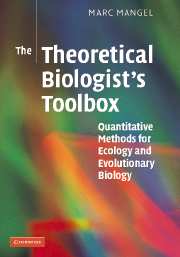Book contents
- Frontmatter
- Contents
- Preface
- Permissions
- 1 Four examples and a metaphor
- 2 Topics from ordinary and partial differential equations
- 3 Probability and some statistics
- 4 The evolutionary ecology of parasitoids
- 5 The population biology of disease
- 6 An introduction to some of the problems of sustainable fisheries
- 7 The basics of stochastic population dynamics
- 8 Applications of stochastic population dynamics to ecology, evolution, and biodemography
- References
- Index
1 - Four examples and a metaphor
Published online by Cambridge University Press: 05 June 2012
- Frontmatter
- Contents
- Preface
- Permissions
- 1 Four examples and a metaphor
- 2 Topics from ordinary and partial differential equations
- 3 Probability and some statistics
- 4 The evolutionary ecology of parasitoids
- 5 The population biology of disease
- 6 An introduction to some of the problems of sustainable fisheries
- 7 The basics of stochastic population dynamics
- 8 Applications of stochastic population dynamics to ecology, evolution, and biodemography
- References
- Index
Summary
Robert Peters (Peters 1991) – who (like Robert MacArthur) tragically died much too young – told us that theory is going beyond the data. I thoroughly subscribe to this definition, and it shades my perspective on theoretical biology (Figure 1.1). That is, theoretical biology begins with the natural world, which we want to understand. By thinking about observations of the world, we conceive an idea about how it works. This is theory, and may already lead to predictions, which can then flow back into our observations of the world. Theory can be formalized using mathematical models that describe appropriate variables and processes. The analysis of such models then provides another level of predictions which we take back to the world (from which new observations may flow). In some cases, analysis may be insufficient and we implement the models using computers through programming (software engineering). These programs may then provide another level of prediction, which can flow back to the models or to the natural world. Thus, in biology there can be many kinds of theory. Indeed, without a doubt the greatest theoretician of biology was Charles Darwin, who went beyond the data by amassing an enormous amount of information on artificial selection and then using it to make inferences about natural selection. (Second place could be disputed, but I vote for Francis Crick.) Does one have to be a great naturalist to be a theoretical biologist?
- Type
- Chapter
- Information
- The Theoretical Biologist's ToolboxQuantitative Methods for Ecology and Evolutionary Biology, pp. 1 - 19Publisher: Cambridge University PressPrint publication year: 2006
- 1
- Cited by



